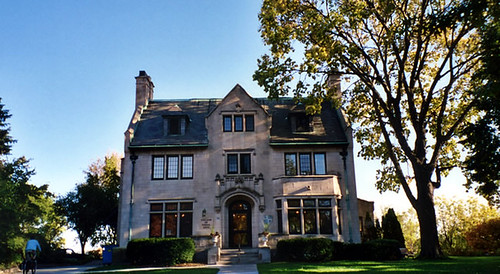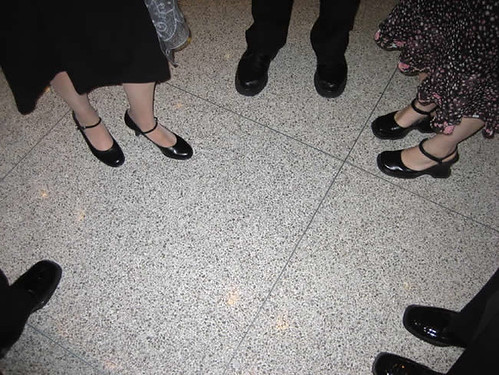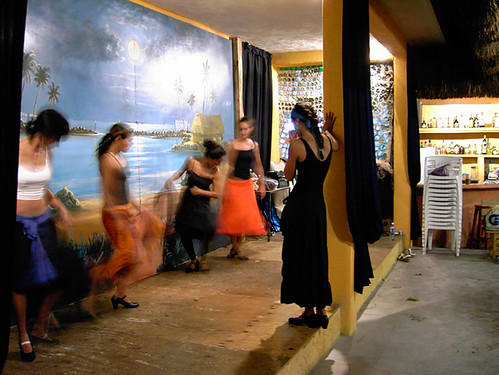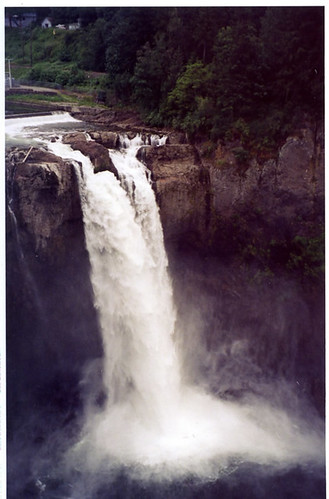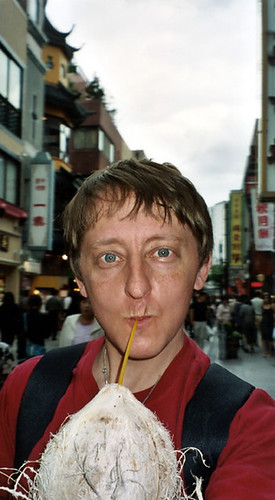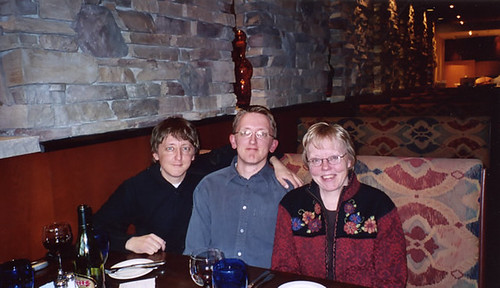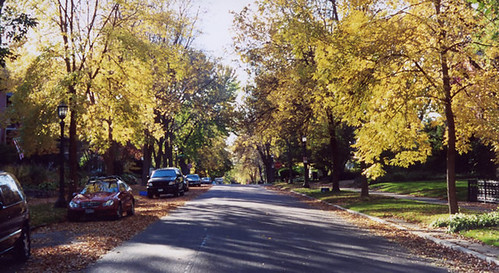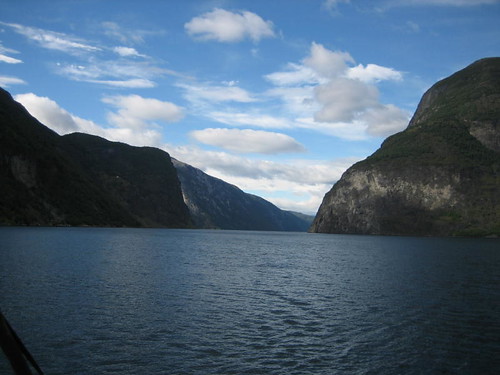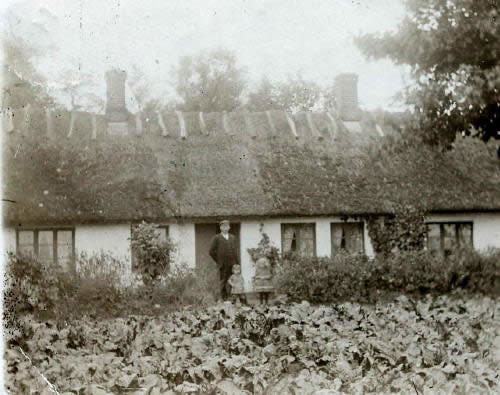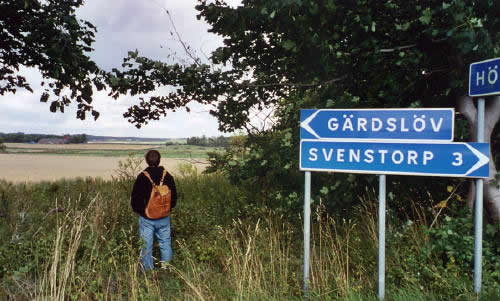I’ve long wanted to interview people as a recurring element of a blog and now hope to make this a regular Wednesday-ish kind of thing. When I received a note from Joy in Moscow, I took advantage of the opportunity to strike up this conversation with someone living in a place I’ve never been but in which I have long held an interest.
So here we have it: a discussion that touches upon the possible connection between Russian vodka culture and the collapse of the Soviet Union, pickled pigs’ feet and ice cream at the height of a Russian winter, and what is it to belong where one does not belong. Blog moderator comments/questions in italics.
Big thanks to Joy for making this happen (including sharing some photos), and props to
Jana for being a vital cog in the connection. J & J: You are appreciated!
MoscowWhat brought you to Russia the first time you went? And inspired you to go back to live and work?What placed me in Russia? First, the collapse of the Soviet Union fascinated me, as I think it fascinated many of us who grew up in the late Cold War era. So I studied Russian in college and went to Moscow on a study-abroad program seven years ago, and then I was hooked. My current stay in Moscow is thanks to a professional-development fellowship for early-career Americans. My field is urban planning and infrastructure development, and so I will be working for the next six months at a British consulting firm whose Russia portfolio focuses on infrastructure.
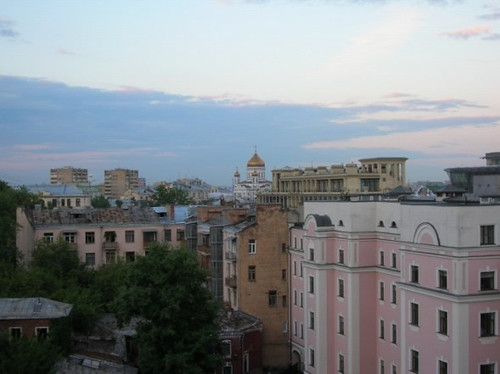
She writes, "The view from my balcony late on a summer night. The church is the Cathedral of Christ the Savior."
The Look of DistanceWhat do you miss most about Russia when you are back in the United States?I think if I were to be quite honest, when I am in the U.S., I miss the feeling of belonging in a place where I don't belong. I miss successfully navigating a large foreign city, of having found my place in it. Related to that, I miss being part of an international group of people. Many of my friends here are also foreigners (though not all American), and we understand why we are not living in our home countries. Many of my Russian friends here are outward-looking and well-traveled, as well. This all sounds a bit snobby, and I suppose it is, but there you go. I also miss more obvious things, like speaking Russian, and the metro (god, especially when I am in the midwest, I miss Moscow's transit). I miss the sky. Moscow has the most amazing clouds, like nowhere else I have lived.
That idea really strikes me: “…belonging in a place I don’t belong.” I realized recently that I’ve spent a third of my year traveling. Home again after three September weeks in Copenhagen and Tokyo/Yokohama, I found myself unable to sleep, unable to shut off my brain, and unable to quell an intense sense of psychological and emotional homelessness. I was depressed and wished again for the feeling of being Elsewhere, because after so much time away from home, I couldn’t get myself to feel at home. And it scared me to feel that way when I was at home. I let my apartment go to shit. I spent money I didn’t have. I was poor at communicating with people. Often, I stayed up all night working or writing in the quixotic hope I might exhaust the feeling.Yes, it is an irony of extensive travel or time abroad. You get used to it, you learn to belong in foreign surroundings, and then when you finally go home, it doesn’t feel right. You have changed, but home feels the same, and you resent home for that. Of course, when it comes down to it, home is not static, but that’s easy for me to forget. That’s another thing that I like about living here and miss in the U.S.; the heightened sense of awareness and observation. I notice more here. I pay attention to my fellow pedestrians, to advertisements, to construction workers...things that are more easily invisible to me at home. Obviously, a heightened awareness of one's surroundings is a general condition when not-at-home and is not unique to Russia. Also obviously, I could force myself to be more observant in the U.S. But it's definitely something I like here.
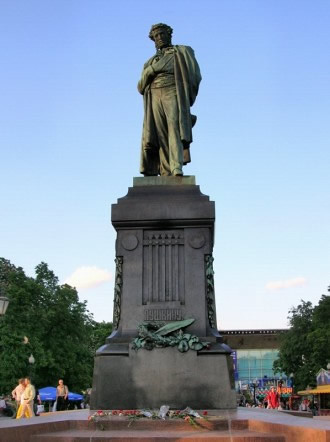
"The Pushkin monument in central Moscow. There are always flowers that people have left. Imagine, leaving flowers for a writer!"
Vodka CultureIn Japan I was fascinated by the vending machine culture. You can find a cold green tea even in an alley and trust its freshness. You can get decent food from them. In Japan, you can live out of vending machines. Now, I've heard--from many drunk sources--that there is vodka in vending machines in Russia. For a tourist, maybe this is striking. But how long does it take to lose its charm when you live there?First, vodka is not sold in vending machines. Very little is sold in vending machines, in fact, with the exception of those machines that sell a foul brown liquid distantly related to coffee and served in little plastic cups. Oh, and the newspaper where I worked several years ago had a Coke machine, but it’s one of only a couple I've ever seen here. However, vodka is very, very easily accessible--almost all kiosks, corner shops, big supermarkets, etc. have it.
Ha! Well, though we seem to have a totally mistaken belief here about Russian vending machines, you’ve noted the ease of acquiring vodka. What’s your impression of the role drinking plays in Russian culture? Is it anywhere near as defining—if not as devastating—as many of us in the US tend to tag the culture with? I guess I should confess that Forbes rated Minneapolis-St Paul the second drunkest urban area in America. So maybe this is a cold-weather cultural challenge, as is having an abundance of fermentable agricultural products. They influence culture, though.
Yes, I would say it is as defining as Americans seem to believe, but far more devastating than most Americans realize. Some of it is probably climate-related. As you note, the Twin Cities are drinking cities, and I think the Finns’ per-capita alcohol consumption may actually exceed Russians’ (though I’m not sure of that). The Finns are more functional alcoholics than the Russians, though. Anyway, drinking culture goes way back here, though mass-scale binge drinking didn’t really catch on until the 20th century. Prior to that, peasants didn’t have the time or money for nonstop vodka. Cheap, easily available alcohol was an important element of social control during the postwar Soviet period. Gorbachev tried to curb alcohol consumption in the 80s, and some people think that that, more than perestroika and glasnost, accelerated the collapse of the Soviet Union. It certainly accelerated Gorbachev’s unpopularity. Then, the 90s were a freefall, a collapse, a catastrophe, total social dislocation for millions of people. Obviously, alcoholism got worse.
Binge drinking is the norm (the standard vodka bottle during the Soviet era could not be recapped, and even though you can cap most of the bottles now, people don’t), so that finishing an entire bottle between two or three friends in one sitting is common practice. Drunk driving is common. Fetal alcohol syndrome is common, as are abandoned children, or homeless children who have run away from alcoholic parents. Add bad diet, stress, and the fact that 63% of Russians smoke (seriously, 63%), and the place is a public-health nightmare. I don’t know how much press Russia’s so-called demographic crisis has gotten in the U.S., but here, they’re getting worried about the fact that the population is shrinking fast. In his state of the union address in April, Putin proposed extra benefits for families that have more children. This is asinine, of course, because while Russia’s birthrate is low, it’s on par with other industrialized nations and actually higher than some. The problem is not births, it’s deaths, but there are no leaders who are willing to address the fact that this country is committing long, slow suicide via vodka and nicotine.
But I think for a lot of foreigners, especially those who are here for only a short while, or those who don’t get outside of Moscow (where economically and socially, things are much better than the rest of the country), the self-destructiveness just seems like glorious hedonism, especially if they’re coming from prudish America.
Moscow Winters, Russian GrubDo you ever write home to people in Minnesota with thoughts like, “You punks don’t know what winter is”? What is a Moscow winter like? Are the ice cream parlors still open? Does everyone wear some sort of thermal spandex beneath their clothes? Or is the layered look abruptly fashionable come mid-October?Ha! No, I am often forced to inform Muscovites that they’re not the only ones who know what winter is. It’s maybe slightly colder here on average than in Minnesota, but overall, it’s about the same. I feel at home, climatologically speaking. It’s darker here, though, and that gets very depressing. By December, it won’t be light until almost 9:30 a.m., and it’ll be dark by 4 p.m. There aren’t really ice cream parlors in the American sense, but there are lots of kiosks that sell ice cream bars and such, and they stay open and do brisk business throughout the winter. My favorite brand name is Russky Kholod (Russian Cold). The ice cream’s not that great, but I admire the fact that they’re making lemonade out of a lemony climate. Russians do not mess around when it comes to warm clothing, and I am often scolded for not dressing warmly enough. Fur coats are not uncommon, though the big fur hats that Americans love to imagine Russians wearing are mostly confined to elderly men and tourists these days.
Finally, what’s your favorite only-in-Moscow thing to eat? And I don’t mean “only-in-Moscow” in a rolling-eyes sense. I mean as in something we probably don’t have in the United States, or might have but perhaps would avoid.Hmmm. Kholodets, jellied pigs’ feet, may actually be a Ukrainian dish, but it’s common in Russia as well. Salo is another Ukrainian thing that’s common here. It’s just lard (usually salted, sometimes smoked) that people slice and eat on bread. I avoid both, and I would advise you to do the same.
But enough of nastiness, there is tasty stuff, too. In many post-imperial countries, the best food tends to be that of the colonized (i.e. Indian food in the UK, or rijstafel in the Netherlands) and that is the case in Russia as well. I adore Georgian food, and it’s very rare outside of Georgia and Russia, though supposedly there is a Georgian place somewhere way out in the Minneapolis burbs these days. Check it out and tell me how it is. Order the khachapuri (cheese bread), the lobio (beans, green or red), the eggplant with walnuts, and the adjapsandal (eggplanty vegetable ragout). Those are all usually under the starters menu. When you hit really good Central Asian food, it’s also a thing of beauty. One of my favorite dishes is lagman, a meaty, vegetably stew with thick noodles. When made well, it has lots of coriander, both ground and fresh.
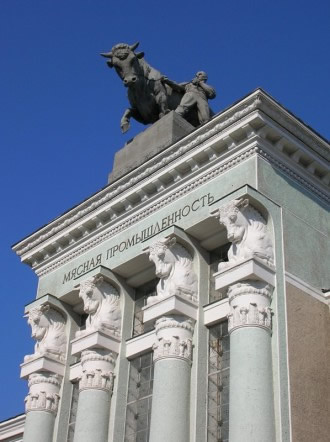
"The now-defunct Meat Manufacturing Pavilion at the Soviet-era All-Russia Exhibition Center. This place is one of the most bizarre sights of Moscow. Cow caryatids!?! So many cultural-theory dissertations..."
